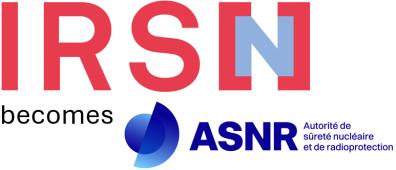Research at IRSN
Research is consubstantial with the IRSN missions, which is why it is referred to as "finalised" and is, by its very nature, multidisciplinary. It focuses not only - like all research - on acquiring new scientific knowledge, but also on developing technical tools required to control risks and help expand the Institute's expertise capabilities.
Research at IRSN is a constant quest for scientific excellence, and its guidelines are consistent with the Institute's strategy and the scientific and technical challenges it sees itself facing. It is research centred entirely, by hypothesis, on the current or future needs of the expertise: either because they have been identified as such during field studies; or because they are supposed to provide responses to recurring, unresolved questions; or lastly, because it is reasonable to think that the development of nuclear or radiological techniques, combined with a wider safety requirement, will of necessity give rise to new questions.
This research, carried out over periods of varying length, forms part of major programmes or anticipative research. Through so-called "basic" research, it aims to understand elementary mechanisms whenever this is necessary, which are then used to consolidate the scientific and technical foundations of results acquired. It may also include "exploratory" research, which fosters continued researcher creativity and the emergence of fecund ideas and contributes to the Institute's scientific identity.
It is normally conducted in the Institute's laboratories, but may also be partly entrusted to other French or international research bodies, more often than not under a collaborative framework. This collaboration with universities, higher education institutions and major scientific bodies is the ideal medium for basic and exploratory research. IRSN seeks this collaboration actively as an illustration of its fervent wish to establish complementary activities with its natural scientific partners and to develop, with them, fruitful synergies. This is especially conveyed by the increasing number of doctoral students welcomed in the Institute's laboratories and the encouragement given to IRSN personnel to become involved in teaching activities. IRSN is also keen on developing European or international partnerships where skills and research costs may be pooled (see heading Collaborations).
The resources allocated to the research effort and the development of the specialist capabilities accounts for about 50% of the Institute's total resources.
Fields of action
In this context, the IRSN research gives priority to the following fields of action:
- Creation of representative models and of simulation tools for phenomena relating to nuclear and radiological risks induced by the various technologies used and by potential attacks on nuclear facilities (earthquakes, floods, malicious acts and so on);
- Compilation of scientific data produced by experiments, radiological monitoring of the environment or populations and operating feedback, likely to validate these models and assess uncertainties over their application in real-life situations;
- Development of operational devices for experimentation, measuring, analysis, testing, monitoring or intervening in an accident situation;
- Development of the necessary scientific and technical skills to provide relevant support to the expertise role;
- Improved knowledge required to take into account societal issues relating to risk management and specific needs for expertise capability in human and social sciences.
The research work is grouped under major programmes spanning several years in the fields of security, safety and protection of man and the environment, with the relevance set by the IRSN's Scientific Board. Programme scientific boards are set up as and when required. These research programmes are adapted to take into account normative and regulatory (especially international), technological, industrial and social issues.
Assessment
A scientific and technical assessment system - key factor in progress - was introduced shortly after IRSN was created. It is based on two types of complementary assessments: "targeted" assessment and more global assessments.
The targeted assessments cover special sections of the Institute's scientific and technical activity, covered by one or other of the major headings below:
- proposals for research programmes or changes to an existing programme;
- results obtained when a research programme has been completed or a major technical milestone has been reached;
- methods or results arising from the expertise domain;
- "service" type activity (environmental monitoring, etc.);
- scientific and technical collaboration;
- research or specialist team.
The assessment is in principle carried out by specialists from outside IRSN, against the yardstick of criteria pertaining to scientific and technical quality, relevance and effectiveness under methods followed in the major research bodies.
The global assessments cover the activity of a division, or even the entire Institute, on given theme. They are based on the use of characteristic activity indicators contributing to scientific and technical excellence: number and variety of quality indicators in publications, contributions to teaching, etc. The use of this assessment method positions the Institute in relation to other bodies, provided it falls within a framework of standardised assessment. For this purpose, IRSN has formed a closer relationship with the Observatoire des sciences et des techniques (Science and Technical Observatory) (OST).
